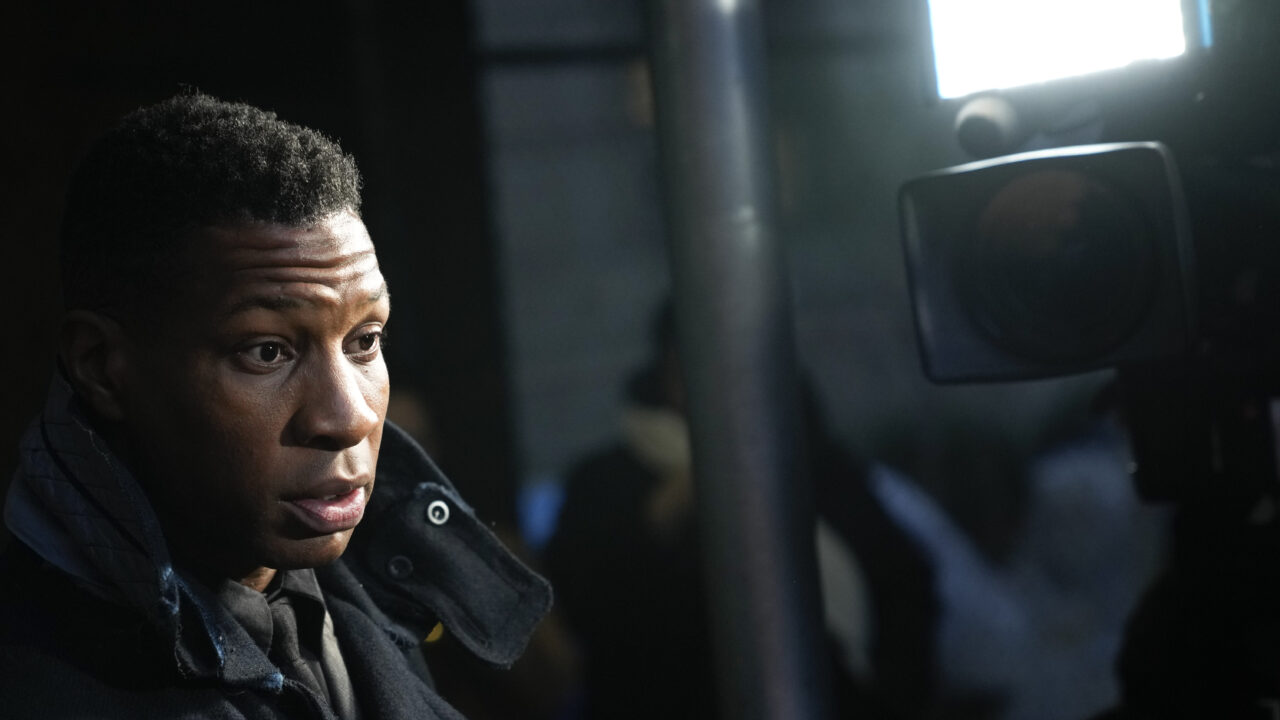Why Progressives Should Welcome Jonathan Majors’ Light Sentence
Ending mass incarceration requires accepting greater leniency for people who do genuinely bad things. Jonathan Majors leaves a courtroom in New York, Monday, Dec. 18, 2023. Majors was convicted of assaulting his former girlfriend during a confrontation in New York City earlier this year. (AP Photo/Seth Wenig)
Jonathan Majors leaves a courtroom in New York, Monday, Dec. 18, 2023. Majors was convicted of assaulting his former girlfriend during a confrontation in New York City earlier this year. (AP Photo/Seth Wenig)
The following story is co-published with Freddie deBoer’s Substack.
Earlier this month, the actor Jonathan Majors was sentenced to a year of domestic violence counseling after being found guilty of assaulting his ex-girlfriend. The response to the sentencing was muted. While there was plenty of social media chatter, some of it anguished, there were few think pieces to be found. Much of the cultural media seemed to find the whole situation to be sordid, and many of the places that you might expect to cover a domestic violence trial ran only brief aggregations of news items about the sentencing. (It would certainly have attracted more commentary in 2018, but that was a different country and a different media and a different internet.) I often turn to Reddit to get a sense of what people are saying about current events; at r/news, unsurprisingly, there was a good deal of angst over a sentence that was perceived to be too light. Twitter had similar thoughts, as did TikTok. Mostly though people seem to want to move on. The Cut devoted an entire piece to hemming and hawing about this type of program, maintaining a permanent ambivalence, but it doesn’t come out and directly object to the Majors sentence.
In general I didn’t hear much outrage. And I think that might be a sign of progress. Because while I certainly understand having mixed feelings about the sentence, it’s exactly the kind of alternative to prison that we need to solve mass incarceration. Prosecutors didn’t ask for jail time, the judge didn’t hand down any, and a first-time Black offender was diverted out of the penal system. That’s exactly what those of us who support comprehensive criminal justice reform have been calling for, these past years. Isn’t it?
While I certainly understand having mixed feelings about the sentence, it’s exactly the kind of alternative to prison that we need to solve mass incarceration.
When I spoke at MIT recently, I pulled a rhetorical move that I admit is a little cheap, but which does help to clarify things. I asked students if they thought that, from a social justice standpoint, a man should go to jail for punching someone in the face, once, as a first-time offender. They all seemed to feel that, no, such a person should not go to jail, that such a punishment is too extreme for the crime. That’s more or less how I feel, too. But then I asked them “What if that person is his wife?,” and watched the confusion spread. Their certainty about what was just suddenly deserted them. The anti-carceral instincts of many progressives are often complicated by “identity crimes,” in this way. There’s a generic sense that our justice system should be more lenient and more forgiving, except when it comes to crimes like domestic violence or sexual assault or hate crimes, in which case the punishments are immediately assumed to be too lenient and too forgiving. Of course I understand that there are specific concerns with these offenses, but given what a big and slow-turning ship the American criminal justice system is, there actually are tensions here that need to be resolved.
The story of Aaron Persky is remarkable, in that it was a liberal cause celebre that immediately preceded another liberal cause celebre that cut in the exact opposite direction. Persky was the judge who handed down the infamous Brock Turner verdict, sentencing the white Stanford student and swimmer to six months in prison for sexually assaulting an unconscious woman. This was immediately seized on as a vestige of “rape culture,” which perhaps it was. Less convincingly, liberals also insisted that it was an example of racial inequality, that Turner received a light sentence because he was white. In subsequent investigations, absolutely no evidence was found that Persky had ever presided in a racially biased way; he was, instead, simply a lenient judge, given to handing down lighter sentences than his peers. It happens that this is exactly what we’re looking for in criminal justice reform – a big part of our mass incarceration problem stems from the fact that judges are much more aggressive than they once were, giving out harsher sentences than their counterparts from earlier eras. Persky was an exception to this tendency towards harsh sentencing, and it appears that this leniency applied to most everyone. But the narrative that Persky was a rape-enabling racist was too juicy for liberals to set aside, in the height of the Yelling Social Justice era, and so Persky was forced off the bench.
A subsequent study found that, as everyone should have expected, the Persky controversy led other judges to pass harsher sentences, and given the structural realities of our system this burden fell especially on Black and Hispanic men. You can say, hey, that’s not what we intended! But it’s a perfectly predictable expression of basic human incentives; when you say to a bunch of judges “be harsher, or it might just cost you your job,” they’re going to be harsher, including to the people you believe should receive less harsh treatment. The system just doesn’t work that surgically, to accept calls for harsher sentencing but only when the defendant is convenient. This is why simply saying, “oh, it’s different if the person he punches is his wife” doesn’t work, because that attitude presumes that we can reform criminal justice with a scalpel. If we’re going to reform it at all, we need to be prepared to do so with sledgehammers, and we’re going to have to commit to not letting the perfect be the enemy of the good.
To actually confront the practical and political and moral problems with our harsh penal system, we have to want more humane outcomes for the people who are guilty.
Well, the Persky affair is ancient history now. (So’s the anti-manspreading law, remember that? The 2010s were a wild time.) What I wish a story like the Majors case might provoke is some grappling with a basic fact: for criminal justice reform to mean anything, for it to work quantitatively but also morally, we must push for lighter and more humane sentences for bad people. It drives me crazy when people talk about criminal justice reform and fixate on the wrongfully accused. I mean, obviously, we shouldn’t arrest or try or convict those who are wrongfully accused, that’s a given. But to actually confront the practical and political and moral problems with our harsh penal system, we have to want more humane outcomes for the people who are guilty. And, no, not just nonviolent drug offenders either. I’m glad this information finally appears to be filtering out there: nonviolent drug offenders are a small part of the overall incarcerated population, across local jails, state prisons, and federal penitentiaries, and they’re also not the only population worthy of getting more chances at rehabilitation. The Prison Policy Initiative has been covering this ground for a long time. As they point out, only one in five incarcerated people in the United States is locked up due to a drug offense. I’m in favor of decriminalization of all drugs, on libertarian grounds, and there are many aspects of the Drug War that are uniquely pernicious. But drugs just aren’t the biggest part of the problem.
No, to effectively combat mass incarcerations and its evils, we’re going to need to take a less retributive approach to all of it, including identity crimes like sexual assault and domestic violence. Luckily enough, despite what people were so fond of saying, so briefly, there’s a lot of room for extensive reform that does not constitute abolishing prisons or defunding the police. There’s a lot of low-hanging fruit and many potential punishments that result in serious intervention without throwing people in jail for years. There’s a whole corpus of thoughtful commentary on such options; the work of the late Mark Kleiman is a great place to start. I personally think the “shock to the system” approach of giving people very short (less than a month) prison stays for certain first offenses holds some promise. Of course some of my readers will reject the whole concept of a more humane and rehabilitative approach to criminal justice, that too is a given. But if you’re like me and you think that we need to make our system less retributive, you have to accept that this is going to result in less harsh punishment for guys we really don’t like. Even, perhaps, guys like Brock Turner. That’s what adult politics is; it’s a stumbling, grasping wander through different bad choices. Sorry.
Is Jonathan Majors a bad guy? He’s not a great one, if he’s guilty of what he’s been accused of, I’m confident of that. Of course, a more apt point is to ask, who am I to say? Perhaps the overriding failure of American liberalism, in the past fifteen or so years, has been a relentless overemphasis on personal moral judgment, the misguided notion that judging is at the heart of politics, that judging is action. I wouldn’t want Jonathan Majors dating someone I care for, that’s for sure. But I also understand that the business of politics is something very different from that kind of personal, emotional attitude. Here in the realm of politics and policy, I do believe in rehabilitation, and in forgiveness. I won’t shed any tears over his destroyed career. But more importantly, most importantly, whether he’s a good guy just isn’t important when it comes to what we want to save him from, and what we want to save ourselves from in freeing men like him.
Your support matters…Independent journalism is under threat and overshadowed by heavily funded mainstream media.
You can help level the playing field. Become a member.
Your tax-deductible contribution keeps us digging beneath the headlines to give you thought-provoking, investigative reporting and analysis that unearths what's really happening- without compromise.
Give today to support our courageous, independent journalists.






You need to be a supporter to comment.
There are currently no responses to this article.
Be the first to respond.